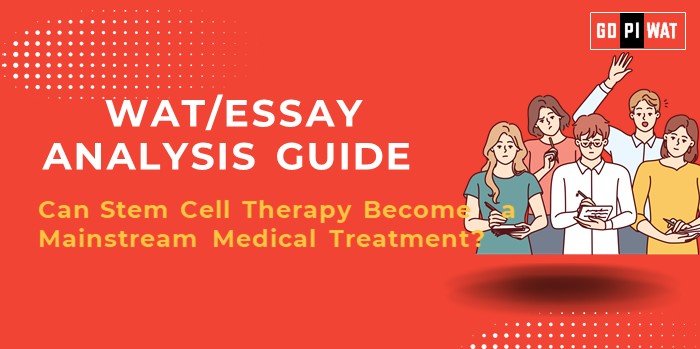📋 WAT/Essay Analysis Guide: Can Stem Cell Therapy Become a Mainstream Medical Treatment?
🌐 Understanding the Topic
Stem cell therapy bridges cutting-edge science and medicine, offering potential cures for chronic and terminal diseases. This essay’s importance lies in examining its potential for mainstream integration amid ethical, financial, and regulatory challenges.
⏳ Effective Planning and Writing
- Time Allocation:
- 🕐 Planning: 5 minutes
- 📝 Writing: 20 minutes
- 🔍 Review: 5 minutes
🎯 Introduction Techniques for Essays
- Contrast Approach: “While the FDA’s 2024 approval of Omisirge signals progress in stem cell therapy, exorbitant costs up to USD 16,500 highlight significant accessibility challenges.”
- Timeline Approach: “From its inception in the 1980s to FDA-approved therapies like Omisirge in 2024, stem cell therapy has grown, yet mainstream adoption remains distant.”
📑 Structuring the Essay Body
📌 Achievements:
- ✅ FDA approvals, including Omisirge in 2024, paving the way for broader acceptance.
- ✅ Breakthroughs in treating hematologic diseases and other chronic conditions.
- ✅ Increased global research activity and clinical trials.
📌 Challenges:
- ⚠️ Ethical debates surrounding embryonic stem cells.
- ⚠️ High costs, with treatments priced up to USD 16,500.
- ⚠️ Regulatory inconsistencies across countries, delaying progress.
📌 Future Outlook:
- Innovations like induced pluripotent stem cells (iPSCs) reducing ethical concerns.
- Global partnerships accelerating research and standardizing regulations.
- Advances in technology to lower therapy costs and improve accessibility.
📜 Concluding Effectively
- Balanced Conclusion: “Stem cell therapy offers transformative potential, but overcoming financial and ethical challenges is key to mainstream adoption.”
- Future-Focused Conclusion: “The road to making stem cell therapy mainstream lies in regulatory harmonization and cost-efficient innovations.”
📈 Analyzing Successes and Shortcomings
- Key Achievements: FDA’s Omisirge approval; increased clinical trials and research advancements.
- Ongoing Challenges: Cost barriers, regulatory inconsistencies, and ethical controversies.
- Global Context: South Korea’s robust support and research initiatives; U.S. regulatory advancements.
🌟 Recommendations for Sustainable Progress
- Invest in cost-reducing research to make therapies more affordable.
- Promote ethical alternatives like induced pluripotent stem cells (iPSCs).
- Foster international collaboration to standardize regulations and promote equitable access.
✍️ Sample Short Essays
- Balanced Perspective: “Despite ethical and financial barriers, stem cell therapy remains a pivotal innovation for medical science, demanding solutions for broader accessibility.”
- Solution-Oriented: “Advancing technologies like iPSCs and reducing therapy costs are essential for stem cell therapy’s mainstream adoption.”
- Global Comparison: “While the U.S. advances regulatory milestones like Omisirge, countries must prioritize cost and ethical solutions for universal access.”


